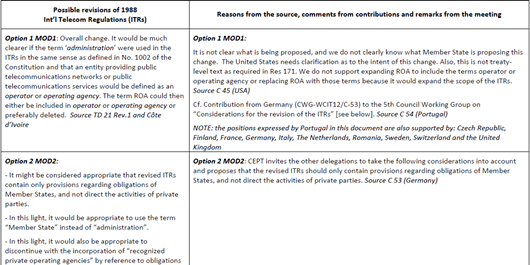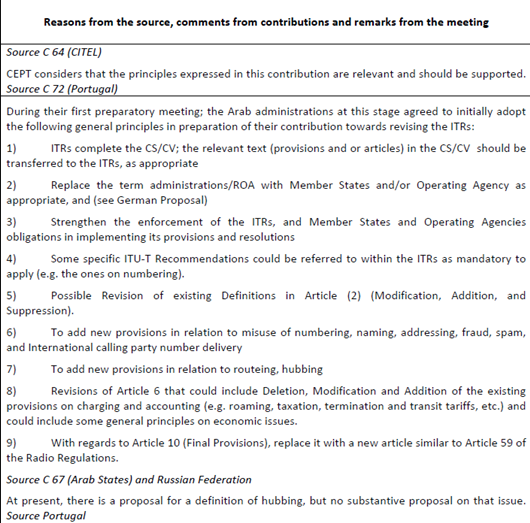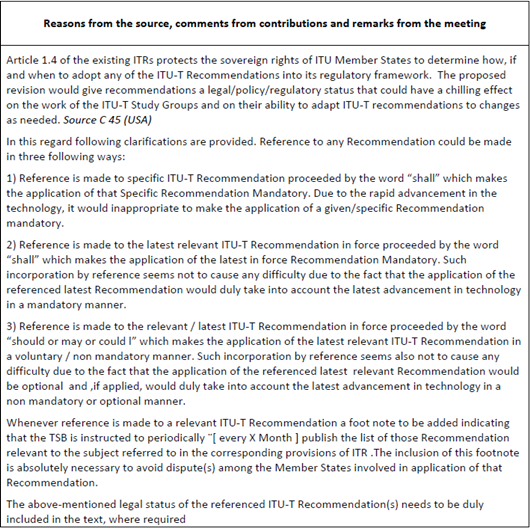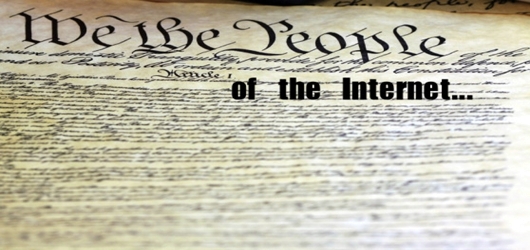It looks like you're using an Ad Blocker.
Please white-list or disable AboveTopSecret.com in your ad-blocking tool.
Thank you.
Some features of ATS will be disabled while you continue to use an ad-blocker.
LEAKED! The NWO Internet Takeover AND Kill Switch Agenda! If You Are Reading This - IT AFFECTS YOU!
page: 1share:
Hello once again ATS. I've come to borrow yet another chunk of your time. Sometimes I do so a bit frivolously. But, sadly, today that is not the case.
Today I bring you news most troubling and foul....

Mark the above picture into your mind ATS - and mark it well. It is the propaganda presentation for the battleground that may well decide the future of our beloved Internet.
Source
What is all the hubbub about? Well the secret is now out...
A document leaked today, dated May 08, 2012, entitled "DRAFT COMPLILATION OF PROPOSALS WITH OPTIONS FOR REVISIONS FOR THE ITRS. This document was created by the International Telecommunication Union. A bit about them:
From the above linked Wikipedia source
Wikipedia also has the following to say about the mission of The ITU:
The ITU has been in existense much longer than has the Internet. In fact it came into being in Paris, France in the year 1865. It later became affiliated with the United Nations, as a specialized agency in 1947.
Of itself the ITU says the following:
Source
They also go on to proudly state that they are responsible for every phone call, coordinating all the worlds satellites, and especially important: making the Internet possible.
Their "About" page sums it up nicely:

Mark the above picture into your mind ATS - and mark it well. It is the propaganda presentation for the battleground that may well decide the future of our beloved Internet.
The ITU will facilitate the The World Congress on International Telecommunications or WCIT, a treaty-level conference that addresses the international rules for telecommunications, including international tariffs.] The previous conference to update the International Telecommunication Regulations (ITRs) was held in Melbourne in 1988. The next conference will be held in Dubai in December 2012.
The treaty itself consists of ten articles and 73 reservations from various of the 111 initial signatory countries. It covers both inter-country communications as well as maritime communications, governing privileged and emergency communications, accounting for services, and exceptions for bilaterally agreed communications.
In August 2012, ITU called for a public consultation on a draft document ahead of the conference. The proposal would allow government restriction or blocking of information disseminated via the internet and create a global regime of monitoring internet communications - including the demand that those who send and receive information identify themselves. It would also allow governments to shut down the internet if there is the belief that it may interfere in the internal affairs of other states or that information of a sensitive nature might be shared.[citation needed]
Telecommunications ministers from 193 countries will attend the conference.
Source
What is all the hubbub about? Well the secret is now out...
A document leaked today, dated May 08, 2012, entitled "DRAFT COMPLILATION OF PROPOSALS WITH OPTIONS FOR REVISIONS FOR THE ITRS. This document was created by the International Telecommunication Union. A bit about them:
The International Telecommunication Union, previously the International Telegraph Union, is the specialized agency of the United Nations which is responsible for information and communication technologies. ITU coordinates the shared global use of the radio spectrum, promotes international cooperation in assigning satellite orbits, works to improve telecommunication infrastructure in the developing world and establishes worldwide standards.
ITU also organizes worldwide and regional exhibitions and forums, such as ITU TELECOM WORLD, bringing together representatives of government and the telecommunications and ICT industry to exchange ideas, knowledge and technology. The ITU is active in areas including broadband Internet, latest-generation wireless technologies, aeronautical and maritime navigation, radio astronomy, satellite-based meteorology, convergence in fixed-mobile phone, Internet access, data, voice, TV broadcasting, and next-generation networks.
ITU is based in Geneva, Switzerland, is a member of the United Nations Development Group and its membership includes 193 Member States and around 700 Sector Members and Associates.
From the above linked Wikipedia source
Wikipedia also has the following to say about the mission of The ITU:
The ITU's mission is to enable the growth and sustained development of telecommunications and information networks, and to facilitate universal access so that people everywhere can participate in, and benefit from, the emerging information society and global economy. The ITU assists in mobilizing the technical, financial, and human resources required to make this vision real.
For the last 20 years, ITU has been coordinating efforts of government and industry and private sector in the development of a global broadband multimedia international mobile telecommunication system, known as IMT. Since 2000, the world has seen the introduction of the first family of standards derived from the IMT concept. Since May 2007, there are more than 1 billion IMT-2000 subscribers in the world.[citation needed] IMT-Advanced provides a global platform on which to build the next generations of mobile services - fast data access, unified messaging and broadband multimedia - in the form of exciting new interactive services.
A major priority of the ITU is bridging the so-called "digital divide" by building adequate and safe information and communication infrastructure and developing confidence in the use of cyberspace through enhanced online security.
The ITU also concentrates on strengthening emergency communications for disaster prevention and mitigation, especially in less developed regions.
The ITU has been in existense much longer than has the Internet. In fact it came into being in Paris, France in the year 1865. It later became affiliated with the United Nations, as a specialized agency in 1947.
Of itself the ITU says the following:
Our Vision
Virtually every facet of modern life – in business, culture or entertainment, at work and at home – depends on information and communication technologies.
Today, there are billions of mobile phone subscribers, close to five billion people with access to television, and tens of millions of new Internet users every year. Hundreds of millions of people around the world use satellite services – whether getting directions from a satellite navigation system, checking the weather forecast or watching television from isolated areas. Millions more use video compression every day in mobile phones, music players and cameras.
ITU is at the very heart of the ICT sector, brokering agreement on technologies, services, and allocation of global resources like radio-frequency spectrum and satellite orbital positions, to create a seamless global communications system that’s robust, reliable, and constantly evolving.
The global international telecommunications network is the largest and most sophisticated engineering feat ever created. You use it every time you log on to the web, send an e-mail or SMS, listen to the radio, watch television, order something online, travel by plane or ship – and of course every time you use a mobile phone, smartphone or tablet computer.
Source
They also go on to proudly state that they are responsible for every phone call, coordinating all the worlds satellites, and especially important: making the Internet possible.
Their "About" page sums it up nicely:
Overview
ITU (International Telecommunication Union) is the United Nations specialized agency for information and communication technologies – ICTs.
We allocate global radio spectrum and satellite orbits, develop the technical standards that ensure networks and technologies seamlessly interconnect, and strive to improve access to ICTs to underserved communities worldwide.
edit on 11/23/12 by Hefficide because: (no reason given)
edit on 11/23/12 by Hefficide because: (no reason given)
ITU membership reads like a Who’s Who of the ICT sector. We’re unique among UN agencies in having both public and private sector membership. So in addition to our 193 Member States, ITU membership includes ICT regulators, leading academic institutions and some 700 private companies.
In an increasingly interconnected world, ITU is the single global organization embracing all players in this dynamic and fast-growing sector.
If you think of the Internet as a vast library - then these people are not only the librarians - but they are also the landlords of the building the library sits upon and the owners of the toll road that leads to it. In some cases they may even be the people who owned the publishing houses that printed the books to begin with. These are the gatekeepers. And they are up to no good....
This article, from yesterday discusses the PDF file this entry is based upon:
IDG News Service (Brussels Bureau) — Control of the Internet must be stopped from falling into the hands of the International Telecommunication Union (ITU), the European Parliament has warned.
The European Union's elected representatives loudly called for negotiators to block attempts by the ITU to gain ultimate control over the Internet at a conference in Dubai next month.
The World Conference on International Telecommunications (WCIT) will attempt to revise international telecommunication regulations, which have not been updated since 1988. A resolution approved by an overwhelming majority of Members of the European Parliament on Thursday warned that some of the proposals presented ahead of WCIT could result in the ITU itself becoming "the ruling power of the Internet," something the parliament is determined to prevent.
"The ITU, or any other single international institution, is not the appropriate body to assert regulatory authority over the Internet," said the resolution, drawn up by Dutch parliamentarian Marietje Schaake.
Source
The silence of other governments upon this issue is, in my humble opinion, greatly disturbing.
The leaked .PDF file itself, which can be accessed here is a 213 page nightmare of legal jargon and double speak. Since PDF's are a pain to deal with using copy and paste, I will use screen captures to illustrate just a few of the troubling passages I have already found in just a cursory overview of the newly leaked document:



These screen shots are nothing more than a teaser to demonstrate the type of language and the seeming agenda at work here. While I am no lawyer, I imagine that Google employs a couple - and Google has the following to say about this upcoming event in Dubai.
Google has jumped headfirst into the debate surrounding an upcoming United Nations telecommunications summit, launching a campaign Tuesday to encourage Web users to sign a petition advocating for a “free and open Web,” while at the same time decrying the conference as a “closed-door meeting,” involving proposals from world governments to “increase censorship and regulate the Internet.”
Google declined to comment further on the record than the following statement issued by its spokesperson: “More than 100 organizations from 50+ countries have raised concerns about an upcoming closed-door meeting in December in Dubai, where governments will consider proposals to increase regulation and censorship of the Internet. People can learn more about the issue on our website — and if they choose to do so, can pledge their support for a free and open Internet.”
Source
This issue, in an article that wasn't even posted when I began writing this OP adds:
Internet freedom advocates are braced for a fight ahead of a key meeting of a major UN body that governs global telecommunications regulations.
The question of who controls the web has been an ongoing debate, and the issue is top of the agenda at a secretive meeting of the International Telecommunications Union (ITU) - a branch of the United Nations - next month.
There's considerable confusion over exactly which countries are behind which proposals to add the internet to the ITU's list of regulatory responsibilities, something campaigners have told PC Pro equates to a land grab that could make it easier for countries to impose restrictions on web traffic.
"The UK, US and Canada and most of Europe don't want these high level controls," said consultant Dominique Lazanski, who will be attending the conference as part of the UK delegation, at an Open Rights Group meeting earlier this week. "The UK and Europe are the good guys in this case.
~Continued...
The proposals up for discussion were first spotted on the ITU website by Australia's News Limited, which reported how the draft proposals "would allow government restriction or blocking of information disseminated via the internet and create a global regime of monitoring internet communications".
The site's analysis found the proposals "included the demand that those who send and receive information identify themselves ... it would also allow governments to shut down the internet".
Source
And some more to be found here
There’s a meeting between the world’s governments in a just a few weeks, and it could very well decide the future of the internet through a binding international treaty. It’s called the World Conference on International Telecommunications (WCIT), and it’s being organized by a government-controlled UN agency called the International Telecommunication Union (ITU).
If some proposals at WCIT are approved, decisions about the internet would be made by a top-down, old-school government-centric agency behind closed doors. Some proposals allow for access to be cut off more easily, threaten privacy, legitimize monitoring and blocking online traffic. Others seek to impose new fees for accessing content, not to mention slowing down connection speeds. If the delicate balance of the internet is upset, it could have grave consequences for businesses and human rights.
The battle lines are clearly drawn in the sand here my friends. And we stand to lose so very much in this battle. Stand up, make your voices heard. Write to your officials, get this issue brought to the surface and onto the mainstream news. We need for every freedom loving person on the planet to have this on their mind - and their eyes on Dubai this coming December 3 through 14.
This is the front line. Soldiers... Mount up, let out your loudest war cry, and stop this madness before it becomes another brick in an already too Orwellian wall of a world....
~Heff
Important Topic Updates
I guess adding the source of the leaked files would help, huh? I'm going to take a mulligan on this one. LOL. I got INTO researching forgot the link.
I guess adding the source of the leaked files would help, huh? I'm going to take a mulligan on this one. LOL. I got INTO researching forgot the link.

WARNING - The Rollins video has a bit of coarse language.
edit on 11/23/12 by Hefficide because: (no reason given)
edit on
11/23/12 by Hefficide because: (no reason given)
We know.
Ron Paul has been warnnig us.
Rand Paul has been trying to stop it.
We got two freedom fighters in government, soon to be one.
Ron Paul has been warnnig us.
Rand Paul has been trying to stop it.
We got two freedom fighters in government, soon to be one.
edit on 23-11-2012 by gladtobehere because: (no reason given)
reply to post by gladtobehere
I do realize that the rumors have been around awhile - but the news here is that the actual agenda - the real documentation is leaked!
I do realize that the rumors have been around awhile - but the news here is that the actual agenda - the real documentation is leaked!
reply to post by gladtobehere
Glad to see that you're apparently in a chipper Holiday spirit!
Allow me to be more clear. Up until now there were vague references to a secret document. NOW the document has leaked and can be reviewed and checked for veracity and intent.
But I guess details are irrelevant when we've got Ron and Rand telling us what to think?
~Heff
Glad to see that you're apparently in a chipper Holiday spirit!
Allow me to be more clear. Up until now there were vague references to a secret document. NOW the document has leaked and can be reviewed and checked for veracity and intent.
But I guess details are irrelevant when we've got Ron and Rand telling us what to think?
~Heff
Im not surprised... been waiting on this to happen for sometime.
As a researcher it does seem to me as the internet has already begun censoring information and of course the thought has always been in the back of my mind that.... it will get worse.
Here we are.... Big Brother is officially here!
As a researcher it does seem to me as the internet has already begun censoring information and of course the thought has always been in the back of my mind that.... it will get worse.
Here we are.... Big Brother is officially here!
Hmmm the document is over 200 pages long. I don't have time to read through it now, it would help if someone who has the time could summarize and
highlight some of the more disturbing parts in the document. The way Google is reacting to this meeting really has me concerned.
" Of course you realize...this means war. " - Bugs Bunny
It seems only fair that if the NWO attempts to take control of the people's Internet, then the people need to take control of the NWO's surveillance
systems.
We're at the point where humanity needs to start playing some serious hardball, with the dark self-serving "new world order" clowns.
"A Tack in the Shoe: Neutralizing and Resisting the New Surveillance"
F.T.G.
We're at the point where humanity needs to start playing some serious hardball, with the dark self-serving "new world order" clowns.
"A Tack in the Shoe: Neutralizing and Resisting the New Surveillance"
F.T.G.
edit on 23-11-2012 by seasoul because: " Even if you are a minority of one, the truth is the truth." -Gandhi
reply to post by Hefficide
Ok so what does a guy who is not a government official supposed to do about this?
It effects me right....what can I do?
I bet nothing is the answer.
Also,my officials don't care about me or you....so now what??
Ok so what does a guy who is not a government official supposed to do about this?
It effects me right....what can I do?
I bet nothing is the answer.
Also,my officials don't care about me or you....so now what??
edit on 23-11-2012 by DrumsRfun because: (no reason given)
reply to post by DrumsRfun
The answer to that question is really easy. You're right, your elected officials don't care about you at all. Nor do they care about me, or Steve, or Mike, or Theresa, or Nicole...
What they do care about is power and their power is accessed by the consent of all of us, as a group. They get to sit in the marble halls, with great salaries, health insurance, and access to all the bribes that they can possibly reach out to grab because WE put them there.
So they do care about you, but only in a collective sense. So the answer is simple. One angry person is a pointless annoyance to them. Ten million angry people is a fire under their butts. United, and with one voice, WE run this show. Don't let them tell you otherwise.
~Heff
The answer to that question is really easy. You're right, your elected officials don't care about you at all. Nor do they care about me, or Steve, or Mike, or Theresa, or Nicole...
What they do care about is power and their power is accessed by the consent of all of us, as a group. They get to sit in the marble halls, with great salaries, health insurance, and access to all the bribes that they can possibly reach out to grab because WE put them there.
So they do care about you, but only in a collective sense. So the answer is simple. One angry person is a pointless annoyance to them. Ten million angry people is a fire under their butts. United, and with one voice, WE run this show. Don't let them tell you otherwise.
~Heff
reply to post by Hefficide
I guess we'll be back to 80's, early 90's type servers to distribute info as to not be to scrutinized then. Or TOR...I gotta learn more about that.
I guess we'll be back to 80's, early 90's type servers to distribute info as to not be to scrutinized then. Or TOR...I gotta learn more about that.
I'm surprised to see the UK painted as a good guy in anything.
Also...

Also...

From what I gather, we are slaves to the elitists who run not only the central world banking industry but many world governments and apparently world
communications...... Does 1984 already exist, and the majority of people just do not realize it yet?
Why do they always do this stuff over the holidays? Damn them! They know our country is too distracted by all the glittering xmas lights and trees.....
EDIT: This makes me want to go ahead and print out all my bookmarks now for future reference!
Why do they always do this stuff over the holidays? Damn them! They know our country is too distracted by all the glittering xmas lights and trees.....
EDIT: This makes me want to go ahead and print out all my bookmarks now for future reference!
edit on 23-11-2012 by Starwise because: (no
reason given)
reply to post by Hefficide
Did "We" really put them there though? I have a hard time with that one. Do they buy their way in? I am leaning more toward the latter these days. My faith in the "elected" Government has diminished.
Also, HOW do we get people off their butts and make them believe the MSM is feeding them lies and what we are saying is the truth?
I find it hard to convince my family they are being lied to, much less others.
Some days I even wonder if "they" (whoever "they" are) are trying their best to make us revolt.
Im ready!!!
Did "We" really put them there though? I have a hard time with that one. Do they buy their way in? I am leaning more toward the latter these days. My faith in the "elected" Government has diminished.
Also, HOW do we get people off their butts and make them believe the MSM is feeding them lies and what we are saying is the truth?
I find it hard to convince my family they are being lied to, much less others.
Some days I even wonder if "they" (whoever "they" are) are trying their best to make us revolt.
Im ready!!!
edit on 23-11-2012 by MamaJ because: (no reason given)
reply to post by Hefficide
I stumbled across this issue while surfing Google. I've already petitioned: filled out my name, stated my argument, and sent it on its way. If there is an accurate list of Google-based protesters anywhere on the internet, my name is on it. And I must say, I'm pretty darned pleased with that.
I've thrown my lot in on this issue, and I'm hoping everyone who reads this thread fills out the petition (name, city, state, and argument for your stance in the issue) and lends their voice to this cause. This is a potential war on the internet, my friends - don't let our digitized freedom fall!
I stumbled across this issue while surfing Google. I've already petitioned: filled out my name, stated my argument, and sent it on its way. If there is an accurate list of Google-based protesters anywhere on the internet, my name is on it. And I must say, I'm pretty darned pleased with that.
I've thrown my lot in on this issue, and I'm hoping everyone who reads this thread fills out the petition (name, city, state, and argument for your stance in the issue) and lends their voice to this cause. This is a potential war on the internet, my friends - don't let our digitized freedom fall!
Scary stuff.
I don't think anyone is going to kill the internet. The idea is just ludicrous.
The global economy would come to a screeching halt. (and then collapse.)
Transportation would stop. Power plants would shut down.
Water plants would stop operating.
Communication would stop.
IF it was possible to kill the internet explain to me the motive.
Explain to me why this evil organization who controls the world governments would be so hell bent on destroying everything? How do they benefit?
If such a power exists wouldn't it be far simpler to maintain control of everything with the existance of the internet? Why would they destroy their most valuable tool?
The entire thing is nonsense.
I don't think anyone is going to kill the internet. The idea is just ludicrous.
The global economy would come to a screeching halt. (and then collapse.)
Transportation would stop. Power plants would shut down.
Water plants would stop operating.
Communication would stop.
IF it was possible to kill the internet explain to me the motive.
Explain to me why this evil organization who controls the world governments would be so hell bent on destroying everything? How do they benefit?
If such a power exists wouldn't it be far simpler to maintain control of everything with the existance of the internet? Why would they destroy their most valuable tool?
The entire thing is nonsense.
new topics
-
The Phenomenon documentary by James Fox
Aliens and UFOs: 2 hours ago -
New UK Petition - Close the borders! Suspend ALL immigration for 5 years!
Regional Politics: 3 hours ago -
The Looking Glass - Episode 3: The Path of Least Resistance
Short Stories: 5 hours ago -
Credit card debt
Relationships: 7 hours ago -
President-elect Trump asks the Supreme Court to Let Tik-Tok Continue Operating in the U.S..
Mainstream News: 7 hours ago -
Treasury Secretary Janet Yellen Says The USA Will Be in Debt Default in Jan 2025 - Unless...
Mainstream News: 11 hours ago
top topics
-
The hunter has become the hunted
Politicians & People: 15 hours ago, 19 flags -
Trump's idea to make Canada the 51st US state: 'Potential is massive'
Mainstream News: 16 hours ago, 14 flags -
Danish Prime Minister said to keep 3 days worth of canned goods on hand
World War Three: 12 hours ago, 5 flags -
Treasury Secretary Janet Yellen Says The USA Will Be in Debt Default in Jan 2025 - Unless...
Mainstream News: 11 hours ago, 5 flags -
Credit card debt
Relationships: 7 hours ago, 4 flags -
Trash To Treasure: Dumpster Diving With Mike The Scavenger
General Chit Chat: 12 hours ago, 3 flags -
The Phenomenon documentary by James Fox
Aliens and UFOs: 2 hours ago, 2 flags -
The Looking Glass - Episode 3: The Path of Least Resistance
Short Stories: 5 hours ago, 1 flags -
New UK Petition - Close the borders! Suspend ALL immigration for 5 years!
Regional Politics: 3 hours ago, 1 flags -
President-elect Trump asks the Supreme Court to Let Tik-Tok Continue Operating in the U.S..
Mainstream News: 7 hours ago, 1 flags
active topics
-
No Wonder We Are In Such INSANE Debt- Americans MUST Put a Stop to This
US Political Madness • 69 • : YourFaceAgain -
Danish Prime Minister said to keep 3 days worth of canned goods on hand
World War Three • 6 • : YourFaceAgain -
Kurakhove officially falls. Russia takes control of major logistics hub city in the southeast.
World War Three • 9 • : YourFaceAgain -
Trump's idea to make Canada the 51st US state: 'Potential is massive'
Mainstream News • 48 • : Flyingclaydisk -
The Acronym Game .. Pt.4
General Chit Chat • 1030 • : JJproductions -
New UK Petition - Close the borders! Suspend ALL immigration for 5 years!
Regional Politics • 4 • : angelchemuel -
The Phenomenon documentary by James Fox
Aliens and UFOs • 1 • : 38181 -
Credit card debt
Relationships • 3 • : Flyingclaydisk -
Liberal Madness and the Constitution of the United States
US Political Madness • 16 • : charlest2 -
-@TH3WH17ERABB17- -Q- ---TIME TO SHOW THE WORLD--- -Part- --44--
Dissecting Disinformation • 3829 • : Crazierfox
